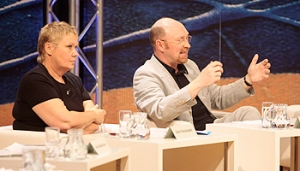 Volker H. Altwasser (Bild: Johannes Puch)
Volker H. Altwasser (Bild: Johannes Puch)
Volker H. Altwasser (G)
Harry Altwasser, the second speaker of the 1st morning of readings, in his “Letzte Fischer” [last fishermen] told the story of the slow death deep-sea fishing, and the dilemma faced by a “young, ambitious man” who has to decide between the sea and his wife – and he failed.
Author portrait
Reading
Discussion
“Does not meet its own standard”
“This text is also not able to meet its own standard”, Karin Fleischanderl opened the discussion, which eventually led to the notorious “Klagenfurt question” of whether a text can be discussed and evaluated within its context: Altwasser’s “Letzte Fischer” is part of a novel trilogy.
Link to Moby Dick
Fleischanderl did not quite know what to do with this text, which “on the one hand is told in a realistic way”, and on the other, makes a number of mythological and literary allusions. “There are two words: Ismael and Ahab. Here a link is made to one of the most famous novels of world literature: Moby Dick. The narrator thus sees the world as mediated by literature – the realistic and banal story, however, does not meet this standard.”
The juror also located a “discrepancy between the myth of masculinity created by the text, life at sea, and the banal life at home”.
 Publikum mit Freda Meissner Blau (Bild: Johanes Puch)
Publikum mit Freda Meissner Blau (Bild: Johanes Puch)
Sea or wife?
Life at sea or living a rather contemplative existence on a fish farm with his wife – these are, according to juror Paul Jandl, a man’s “eternal and vital questions”. “There are two texts here, one could have been made into a lot, the other one not so much.” Some passages were very dense and well designed. He also liked the display of specialist knowledge.
However, Jandl believes, where the text slides into the psychological, it turns into a Peter-Pan story, a “book for juveniles”.
Several stories in one
Alain Claude Sulzer also saw several stories packaged into one. The changes of perspective in the story, however, are implausible for a third-person narrator, the auctorial narrator, who is only present in three sentences. “And: What’s that supposed to be? I see the word ‘Verdammt’ [damn] six times on one page – if that’s deliberate then I am not sure what that’s supposed to be – or it is careless.”
 Alain Claude Sulzer (Bild: Johannes Puch)
Alain Claude Sulzer (Bild: Johannes Puch)
Respect for “bizarre day-to-day occurrence”
Burkhard Spinnen gave credit to the text for its long and stretched out “bizarre day-to-day occurrence”. “While reading it at home I felt like checking it all out straight away on Wikipedia”, only to notice at the last moment: wait, this is literature.
The question is, according to Spinnen: “Has German literature ever owned the sea? Probably not. Is it still fighting for it? I feel like the matter is done with, literarily speaking. But is it really?” Spinnen was “taken” by the trick of transforming the ship canning factory at sea into something else for quite some time. However, the position of the figure increasingly turns satirical – unintentionally.
“But I find it wonderful that the pretence is that there is still today something as exorbitantly valuable as pepper once used to be.”
 Jurydiskussion (Bild: Johannes Puch)
Jurydiskussion (Bild: Johannes Puch)
“Craftsmanship”
Hubert Winkels agreed with everything and thought he detected “craftsmanship” – “but that’s only where literature begins”. The fantastic idea however – the search for the skin of a valuable fish – fails.
Then a debate broke out among the jury about the possibility of contemporary allegories.
Hildegard Elisabeth Keller then remarked: “This text is rich, and also rich in exclamation marks, which points to a degree of “linguistic poverty”.
 TDDl 2010
TDDl 2010